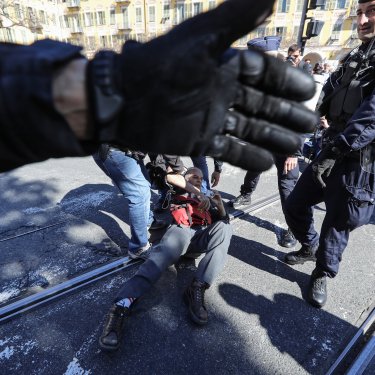Making police unidentifiable in the media, the proposed French bill would seriously restrict press freedom

Reporters Without Borders (RSF) urges France’s National Assembly neither to put on the agenda, nor to examine a new bill that would require the media to “make security forces unidentifiable” in any photo or video they publish or broadcast. The proposed law would make it very hard for journalists to cover many public events, which often involve a police presence, and would restrict the information about police behaviour available to the public.
Submitted on 26 May by Éric Ciotti and other members of the centre-right “The Republicans” party (LR), the bill would make the publication or broadcasting of identifiable images of “officers of national police, military, local police or customs officers” in any media outlet punishable by up to a year in prison and a fine of 15,000 euros. It has not yet been put on the National Assembly’s agenda and cannot be examined by any parliamentary committee until it has.
In RSF’s view, the public’s right to information requires journalists to be able to observe and cover the behaviour of the police and other security forces. It would be extremely difficult for them to systematically render individual police officers unidentifiable by means of pixelating or blurring during live coverage, especially if there were many policemen and they were moving.
Drafted with the declared aim of protecting the police from threats, attacks and online harassment, the proposed law would make it very hard for the media to provide live coverage of events with a police presence and, in particular, to provide the public with full information about police conduct as the events are taking place.
Mistrust of the police has grown in France as a result of their conduct during the “Yellow Vest” protests that began in October 2018 and during protests against pension reform. The police have repeatedly been accused of using excessive force and, last December, RSF joined 13 journalists in filing a complaint against the police violence to which they were subjected while covering protests.
The police, for their part, have not hesitated to put pressure on the journalists who report their excesses. The latest is example is a Mediapart journalist who was summoned – as suspect in concealing a violation of professional confidentiality – for interrogation at the National Police General Inspectorate (the police internal investigations section) for reporting the role of the police in acts of violence against an activist, Geneviève Legay, in Nice on 23 March.
“Adoption of this proposed law would constitute a serious violation of press freedom in France,” said Paul Coppin, the Head of RSF’s Legal Unit. “The way to end the abuses and mistrust is to overhaul the rules on policing and overhaul police training, not restrict journalists’ freedom.”
As it stands, France’s legislation does not allow the police to object to being photographed or filmed on the street, to request the destruction of photos or video, to prevent photos or video from being broadcast or published, or to arrest anyone simply for photographing or filming them. And they enjoy no special protection under French law protecting a person’s “image rights.” Only the use of photos and video of police working in counter-terrorism, counter-espionage or the special intervention forces is restricted.
RSF is of the view that this legislation should not be changed. It therefore urges the National Assembly to not register this bill on its agenda, to not examine it, and to reject any other attempt to restrict journalistic freedoms.
France is ranked 34th out of 180 countries in RSF's 2020 World Press Freedom Index.



